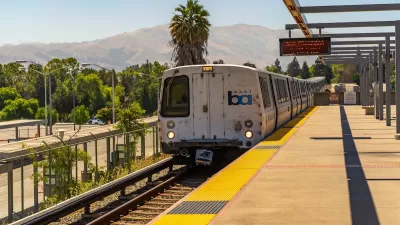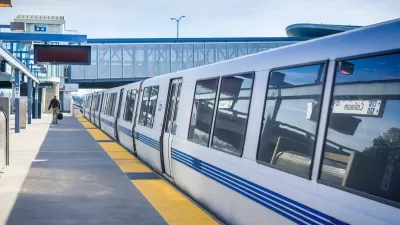A contest in the San Francisco Bay Area will select 30 short stories that will be available at special vending kiosks at transit stations.

As reported in Bloomberg CityLab by Sarah Holder, the Bay Area Rapid Transit District (BART) is launching a short story contest to encourage riders to get back on public transit and explore the network’s services. “Starting June 1, the transit agency will start accepting short stories of 7,500 characters or less with the theme of ‘motion.’ A panel of local writers will choose 30 to dispense in kiosks placed in four stations across the network.”
Based on the concept first introduced by French start-up Short Édition, “which pioneered and first piloted the petite fiction repositories in Grenoble in 2011,” the kiosks are part of the agency’s effort to “get riders back on trains for more than just their work commute and to inspire them to visit more of the network.”
With commuter ridership still far below pre-pandemic levels, Holder notes that “There may be more opportunity to win back remote-working riders when they’re off the clock: Weekday ridership is now at 35% of pre-pandemic levels, says Trost, while weekends are back to 60%,” signaling a growing need to reorient transit services to non-commuters.
“Unlike the MTA’s ‘Poetry in Motion’ or other underground public art installations, the short story dispensers offer a tangible and portable diversion. Printed in long, thin, receipt-like strands, the stories are sourced from community contributors, as well as classic authors whose works are no longer under copyright.”
FULL STORY: San Francisco Public Transit Wants To Win Back Riders by Featuring Writers

Maui's Vacation Rental Debate Turns Ugly
Verbal attacks, misinformation campaigns and fistfights plague a high-stakes debate to convert thousands of vacation rentals into long-term housing.

Planetizen Federal Action Tracker
A weekly monitor of how Trump’s orders and actions are impacting planners and planning in America.

San Francisco Suspends Traffic Calming Amidst Record Deaths
Citing “a challenging fiscal landscape,” the city will cease the program on the heels of 42 traffic deaths, including 24 pedestrians.

Defunct Pittsburgh Power Plant to Become Residential Tower
A decommissioned steam heat plant will be redeveloped into almost 100 affordable housing units.

Trump Prompts Restructuring of Transportation Research Board in “Unprecedented Overreach”
The TRB has eliminated more than half of its committees including those focused on climate, equity, and cities.

Amtrak Rolls Out New Orleans to Alabama “Mardi Gras” Train
The new service will operate morning and evening departures between Mobile and New Orleans.
Urban Design for Planners 1: Software Tools
This six-course series explores essential urban design concepts using open source software and equips planners with the tools they need to participate fully in the urban design process.
Planning for Universal Design
Learn the tools for implementing Universal Design in planning regulations.
Heyer Gruel & Associates PA
JM Goldson LLC
Custer County Colorado
City of Camden Redevelopment Agency
City of Astoria
Transportation Research & Education Center (TREC) at Portland State University
Jefferson Parish Government
Camden Redevelopment Agency
City of Claremont





























